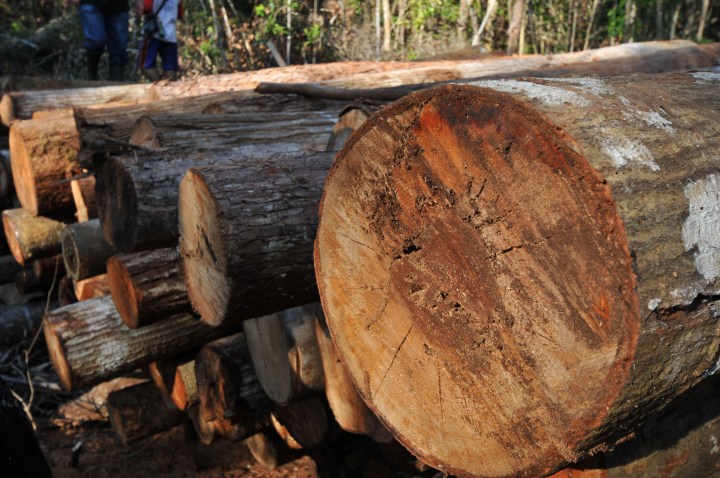ISS TODAY
Conflict and organised crime are razing Central African Republic’s rainforests

International support is needed to sanction businesses complicit in timber trafficking from the Central African Republic.
Forests cover just more than one-third of the Central African Republic’s (CAR) territory. The forestry sector is a vital source of income and employment, contributing 13% of the country’s export revenue.
This precious resource is, however, under threat from years of conflict and widespread criminality. Illegal logging, firewood trafficking for charcoal, and timber trafficking contribute to a deforestation rate of about 1% of total rainforest coverage every year. The most sought-after wood species is Sapele – a reddish-brown hardwood widely used for making furniture, decorative veneers and musical instruments.
At the base of the criminal chain are traffickers from the Democratic Republic of Congo, Congo-Brazzaville, Cameroon, Chad, Sudan and South Sudan, according to findings from recent ENACT research. The kingpins are foreigners from Asian countries. While the CAR is the source for illegal logging, wood and products are trafficked through neighbouring countries via several road and waterway transit corridors.
The illicit trade is exacerbated by weak law enforcement, porous borders and increasing transnational demand for the country’s timber products. Timber trafficking has also been enabled by the CAR’s protracted political instability, and has played a major role in funding the conflict that has decimated the country. Illegal timber exports have attracted militias and armed groups seeking funds to buy weapons in a power struggle that has collapsed the state and claimed the lives of thousands of citizens.
After a coalition of Séléka rebels deposed then-president François Bozizé in 2013, thousands were tortured and killed. During the Séléka rule, Chinese, French and Lebanese trading firms continued to illegally sell the CAR’s rainforest timber on a large scale, according to a Global Witness report. These companies paid an estimated €3.4-million for “protection” services, empowering the Séléka rebels to sustain armed groups on the ground and procure weapons.
The Wagner factor
In what appears to be a historical pattern of foreign establishments scrambling for the CAR’s natural resources, the recent incursion of the Russian Wagner Group has brought back this criminal enterprise. This has resulted in devastation for both rural residents and the environment in the rainforest regions.
According to the Armed Conflict Location & Event Data Project, 180 events involving Wagner mercenaries targeting civilians have been recorded since December 2020. Civil society investigative sources have raised concerns about the links between the protracted conflict and forest exploitation in the CAR. To cut the timber at almost no cost, mercenaries have committed human rights abuses, including invading and “emptying” towns and villages – contributing to instability in the rainforest region.
A tripartite arrangement has been struck between some government officials, Wagner and a Russia-based enterprise registered in the CAR. This enterprise is apparently headed by a local director who works with Russian representatives to sell wood from the CAR that has been harvested through fraudulent forestland concessions.
Wood exports would be a profitable business for the Wagner Group and a way to channel cash back into a sanctioned Russia.
For example, military operations launched by the CAR army, with Wagner’s support, aimed to dislodge rebel forces in several cities in the Lobaye region and in Ndanga village. But the investigative report suggests a different motive for the operation. By the time the Russia-based enterprise was awarded the forestry concession, Wagner soldiers were already in control of the surrounding areas. Military action could therefore be providing disguised protection for timber logging.
In the CAR and most forest-rich African countries, illegal logging is often facilitated by fraudulent forestland concessions awarded by state authorities. Permits meant for local logging and timber-processing companies are instead granted to large foreign companies. In addition to the concession to log in these otherwise restricted areas, the foreign firms operate loosely without government oversight.
Wagner and its business partners could be using this approach to generate a potential revenue of$890-million in international markets (assuming that 30% of the concession is exploited). As such, wood exports would be a profitable business for the Wagner Group and a way to channel cash back into a sanctioned Russia, says the report.
State-sponsored corruption in the forestry sector presents a complex case in the CAR. Nevertheless, international advocacy groups on environmental conservation can help by working with citizens and pro-reform policymakers to drive change.
Read more in Daily Maverick: Wagner mercenaries have entirely captured Central African Republic, The Sentry report finds
Mitigation measures include enhancing transparency, government oversight and full participation in the implementation of timber concessions. Legal and procedural reforms are also needed, along with fair competition to guarantee indigenous business participation in the forestry sector.
The biggest challenge, however, is securing high-level government commitment to stamping out extractive corruption in the logging sector, especially regarding illegal loggers and their associates who are protected by the authorities. In Gabon for example, both the vice-president and minister of forests were sacked in 2019 over a scandal related to corruption and illegal logging.
Curbing the activities of foreign actors, businesses and enablers of illegal logging and timber trafficking in the CAR is a Herculean task. It is likely to require pressure from the international community for sanctions against enterprises in the global timber trade. DM
Oluwole Ojewale, Regional Organised Crime Observatory Coordinator – Central Africa, ENACT, Institute for Security Studies (ISS).
ENACT is funded by the European Union and implemented by the Institute for Security Studies in partnership with INTERPOL and the Global Initiative against Transnational Organized Crime.
First published by ISS Today


















 Become an Insider
Become an Insider
Comments - Please login in order to comment.